We celebrate the end of the year the only way we know how: through lists, essays, and mixes. Join us as we explore the music and films that helped define the year. More from this series
20. Black Box
Dir. Stephen Cone
[Cone Arts]

Undoubtedly our biggest cinematic surprise in 2013, Stephen Cone’s Black Box came out of nowhere (a void, a black box, no press, no hype) but has hauntingly occupied our lives since. Black Box was a film about a theater production of a novel, but what propelled it were stunning shifts in tone — not the shifts between narrative levels for which such multi-textual material would seem ripe. Instead of flaunting high-concept meta à la Charlie Kaufman, Black Box framed adaptation as a normal human (rather than an exceptional textual) activity. Even in its numerous and electrifying scenes of actors playing actors, nothing seemed doubly performed: for these theater majors, like all of us, playing roles and playing selves were part of the same messy continuum. Their off-stage acting out of their own desires and hang-ups collided weirdly yet elegantly with the play’s fictional source material, a macabre young adult novel that allegorizes society’s brutal policing of youthful bodies. But Cone didn’t make a message movie. For all the clarity of the interactions between characters within the small, unadorned space they rehearsed in, what ultimately lingered was opaqueness: of their lives beyond the space of performances (mere glimpses), of the production they ultimately perform (only moments), of the book it’s based on (snippets). Cone made a film that was firmly in the immediate, yet pervaded by ghosts.
19. Pavilion
Dir. Tim Sutton
[Factory 25]
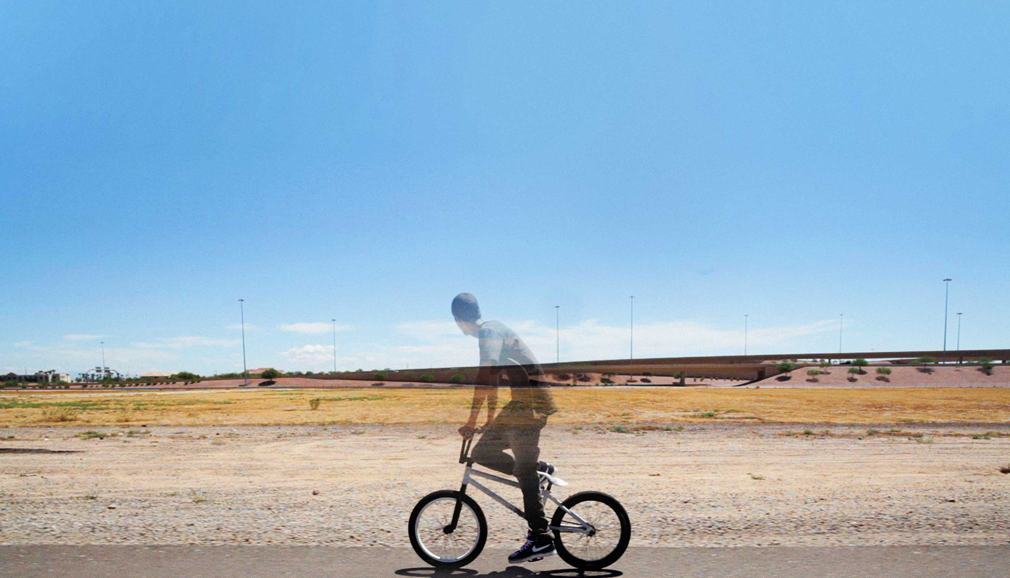
A year or so ago, I was invited to stay at a young friend’s house for awhile. The night I arrived, he was getting a tattoo in the living room. His friends were sitting around, getting stoned and drinking shitty domestics. Their home was going to be foreclosed upon. They had given up even trying to take care of it. Grass had turned back to dirt. The garage door didn’t close all the way, and no longer concealed the trash piled up, waist high. The night before I moved out, my friend stumbled into my room drunk, looked down, and mumbled, “I’m sorry.” Sometimes when I think about who art (often) leaves out, I think about people like him. Let’s be honest. There is no poetry in undeveloped suburbs. There is no poetry in being stuck in a dead end, minimum wage job. There is no poetry in letting your ambition slip into oblivion. It’s fucking shitty, and sad, and desperate. And while there was so much in Pavilion worth celebrating, above all is the way it took its camera into the one place that would never appreciate its gorgeous product, and let it rest.
18. Sun Don’t Shine
Dir. Amy Seimetz
[Factory 25]

In spite of the title, the sun was almost omnipresent in Sun Don’t Shine, Amy Seimetz’s impressive feature directorial debut (she’s already an indie household name with her acting career, including an outstanding performance in Upstream Color, also present in our year-end list). Taking the classic noir staple of two lovers on the run but placing the characters against the backdrop of sunny Florida, the reasons behind their fleeing is just was mysterious as their personal backgrounds. We did know, however, that something was very wrong. The sun-drenched imagery was in sharp contrast to the claustrophobic close-up shots, which reinforced the somberness of their clashing personalities, paranoia, and personal anguishes. Road movies often touch on themes of self-discovery and freedom, intertwining the two amidst the promise that the highway will take us someplace new. Everything will be forgotten. But at the end of the day, we find ourselves burdened by the weight of our personal traumas no matter how far or how fast we go. We learned very little about these two people, but we could deduce from the very first scene, in which Crystal (Kate Lyn Sheil) desperately gasps for air, that their fate was doomed. And the sun won’t shine.
17. Paradise: Love
Dir. Ulrich Seidl
[Strand Releasing]
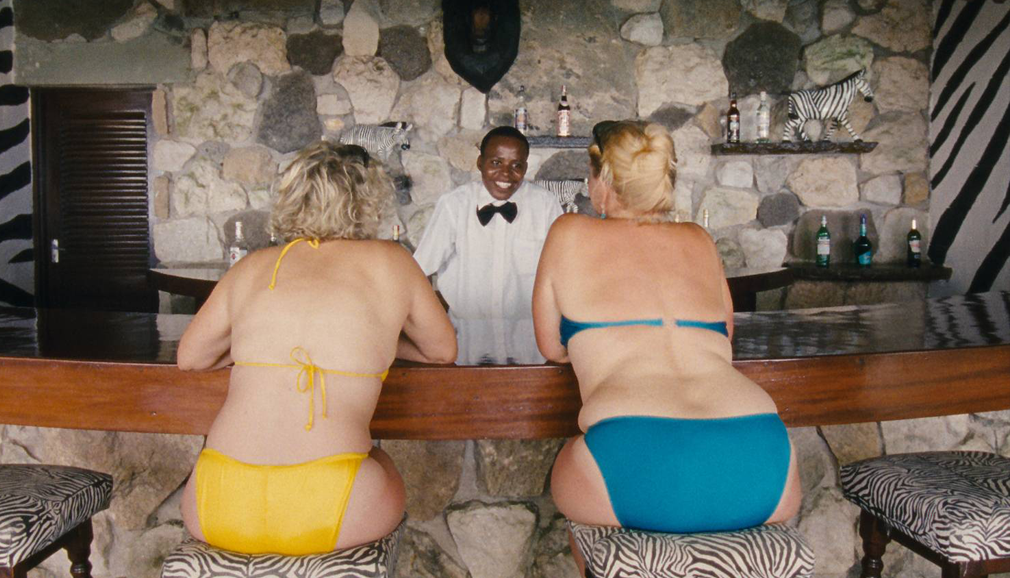
Unsurprisingly, John Waters said it best: “Fassbinder died, so God gave us Ulrich Seidl.” It’s not hard to see what Baltimore’s resident shock comedy filmmaker/artistic genius loved in the first part of Seidl’s Paradise Trilogy — it’s at once the most upsetting film in the filmmaker’s deeply upsetting oeuvre and the first to truly embrace a comedy of the absurd, even if that comedy was of the cold and formally rigorous Austrian variety. In a year rife with raw looks at the intersection of race, sex, and class in a fully globalized context, Paradise: Love’s extremely explicit look at female sex tourists and Kenyan lovers was the most schematically calculated of the bunch, and commendably so. But it was the knife’s edge intermingling of comedic kitsch and horror, Renaissance beauty and modernist severity, that set it apart and brought its rigorous dissections into increasingly murky territory. Aided immeasurably by Margarethe Tiesel and Peter Kazungu’s nuanced and warm performances of exploitation embodied, no other film this year wandered as far into the deep end of desire as Paradise: Love did in its climatic half-orgy of tinny boomboxes and ribbons tied onto flaccid cocks. Funny, though.
16. The World’s End
Dir. Edgar Wright
[Focus Features]
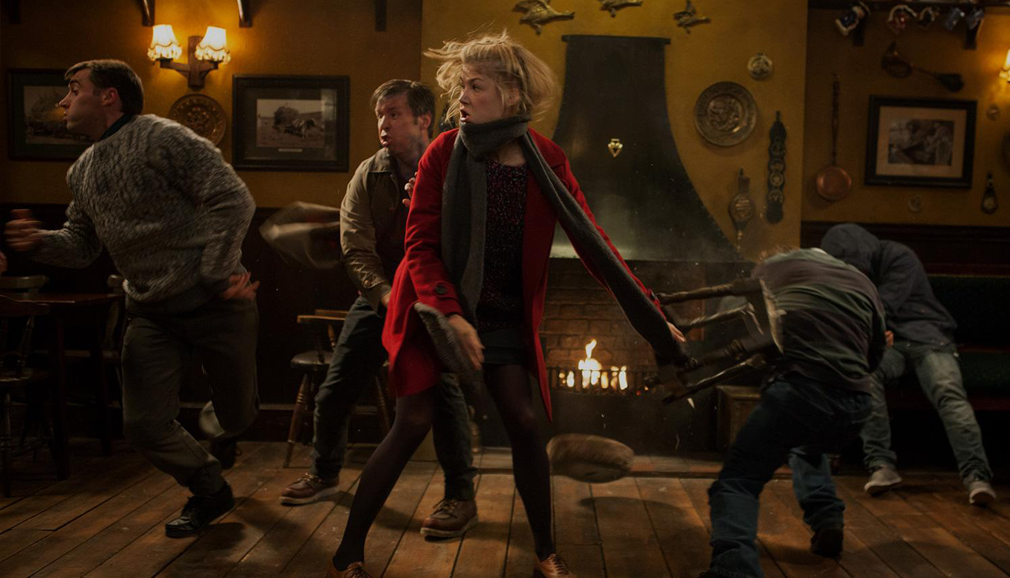
In five years, fans of Edgar Wright will likely find it hard to imagine his Cornetto Trilogy without this year’s concluding entry, The World’s End. But for now, it just sort of rests there. It’s good, but is it as good as the other two? Was it sci-fi enough? Was it funny enough? All these built-in pressures and inevitable comparisons surely weighed on the director, as he funneled one of his most elaborate, layered stories through some of the sharpest, most frenetic reaches of his now-signature visual style, into an end product that still feels firmly rooted in the current comedic landscape. There was another apocalypse comedy this year. There were other meditations on arrested development. There were other movies about beer or aliens or groups of friends getting back together etc. But who cares? Wright worked his ass off on this movie, and for all the merits of uniqueness, it doesn’t trump skillful, intelligent execution, which this film has in spades. Add to that the unmistakably present voice of a talented director, and it’s tough to argue that The World’s End isn’t a worthy finale.
15. Wrong
Dir. Quentin Dupieux
[Drafthouse Films]

Wrong showed the lighter side of existential dread. The film’s increasingly befuddled protagonist tried to find his lost dog in an absurd world where duplicitous gardeners were struggling to learn how to draw, it was constantly raining inside an office, and dogshit had its own story to tell. If done poorly, this would be the stuff of nightmares — or worse yet, pretentious student films — but luckily, writer/director Quentin Dupieux handled everything with a comic bent that highlighted his assured filmmaking and firm grasp of tone. William Fichtner delivered one of the best performances of the year as Master Cheng, the enigmatic guru who loves animals, invasive telepathy, and maintaining an exquisitely groomed rattail. There was a sense of menace and creeping doom lingering under every scene, giving Wrong an enthralling, dangerous feeling that anything could have happened — and it would all still work. Wrong will live eternally in the poorly lit gloom of the insomniac’s room, a new cult rising for an utterly unique film with profound moments gleaned from a funhouse-mirror reflection of our lives.
14. Everything is Terrible! Does the Hip-Hop / Comic Relief Zero
Dir. Everything is Terrible!
[Everything is Terrible!]
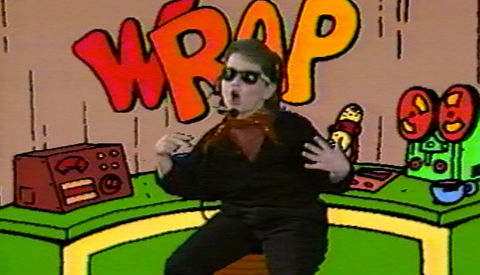
While the first two Everything is Terrible! films are both great, it wasn’t until Doggiewoggiez! Poochiewoochiez!, their first film with a decided concept, that their work transcended to a state of pure found footage, ADHD bliss. Relying on much broader (and easier to navigate) concepts, this double feature follow-up re-formatted the cultural detritus of hip-hop and stand-up comedy. Everything is Terrible! Does the Hip-Hop Vol. 1: Gettin’ a Bad Rap! is as much pregame/power hour dance party as cultural critique. Courtesy of the editing skillz of the Final Cut “pros” at EiT!, the film contained the propulsive rhythm of a music video. So hypnotic was this effect it made us here at TMT dance along as they turned VHS vomit into Jodorowsky gold. If Gettin’ a Bad Rap was the party, then Comic Relief Zero was the come down, a sobering look at comedy routines that are just that: routine. By decontextualizing and recontextualizing stand-up performances, ugly patterns emerged: racism, sexism, homophobia, bad comedy, to name a few. A stagnant, unforgiving portrait of stand-up coalesced, forcing us to re-examine ourselves and our tastes. With this new double feature, EiT! has made us face our demons — for exploiting an art form and for exploiting each other.
13. Stories We Tell
Dir. Sarah Polley
[Roadside Attractions]
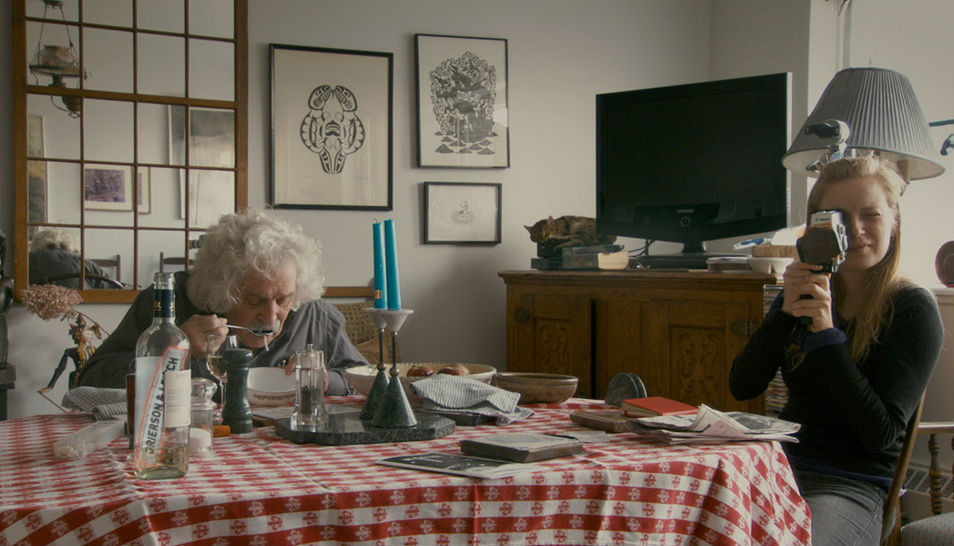
A documentary in the sense that it is non-fiction, but purely a film in that it dwells far outside the factual and clearly within the subjective, Sarah Polley’s third feature, Stories We Tell is a hyper-egoistic document of her own life and family, told through recollections of Polley’s mother from near everyone who knew her. It plays less like reading someone’s diary and more like reading someone’s medical charts; it’s personal and purposefully intrusive on the lives of Polley and everyone else involved, similar to Jonathan Caouette’s absent-mindedly brilliant Tarnation in that Polley and Caouette are both fascinated with themselves, their own stories, and deem them worthy of greater examination and exposure. The narrative of Stories We Tell is both marginally important and incomplete, told not just from one perspective but from many. And that distinction — that this story (or stories) exists in so many forms at once — is as much the point as the “story” itself about Polley’s mother, her husband, and another man in the 1970s. It is about the story and about the action of telling the story, at once and equally, making something greater than just entertainment: a conversation.
12. Pieta
Dir. Ki-duk Kim
[Drafthouse Films]

Gang-Do, the central character of Ki-Duk Kim’s Pieta, was animalistic and he is not animalistic. He committed acts of violence (mercifully left off-screen) like a predator stalking his prey, chilly calm exploding into blood-letting terror. He committed acts of sex (mercilessly left on-screen) like a stray, both pathetic and utilitarian. Elementally, though, these traits are not natural to only the animal world: humans, too, can have all warmth chipped away into numb, unfeeling survival. It was only through the appearance of his mother, Mi-Son, a woman who abandoned him at birth, that he was dragged into the world of human emotion. As Pieta’s events unfolded, the audience was left developing pathos for the previously-irredeemable Gang-Do, while witnessing the horror of vulnerability — a complete spectrum flip from the cruelty of the film’s outset. South Korean film has developed a reputation for innovation in the field of revenge, but Pieta suggested the most brutal tactic of all may be forcing a person to feel. Oh, to be a dog again.
11. 12 Years a Slave
Dir. Steve McQueen
[Fox Searchlight]

Once, maybe twice a year, I see a film that makes it difficult to talk afterward. 12 Years a Slave was that film for me this year. Eyes damp, my friend and I shuffled out into the cold street sighing, staring fixedly, and shaking our heads. Despite some unconvincing accents and producer Brad Pitt’s cameo, the film’s representations of life (or half-life, or life-in-death) as a slave, slave driver, master, master’s wife, and so forth were viscerally and intellectually shattering. The only adequate words I have are Kafka’s: “Altogether, I think we ought to [watch] only [films] that bite and sting us. If the [film] we are [watching] doesn’t shake us awake like a blow to the skull, why bother [watching] it in the first place? So that it can make us happy, as you put it? Good God, we’d be just as happy if we had no [films] at all […]. What we need are [films] that hit us like a most painful misfortune, like the death of someone we loved more than we love ourselves, that make us feel as though we had been banished to the woods, far from any human presence, like suicide. A [film] must be the axe for the frozen sea within us.”
We celebrate the end of the year the only way we know how: through lists, essays, and mixes. Join us as we explore the music and films that helped define the year. More from this series
